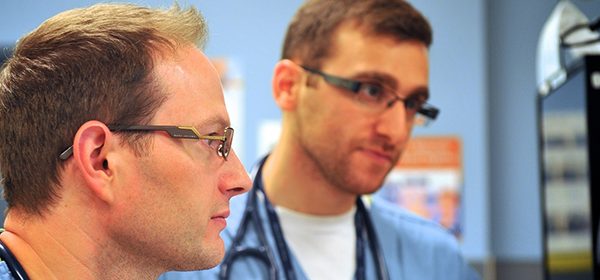New bedside devices will feed real time data into patient records
Bedside Medical Device Integration will be coming to a site near you as part of the Clinical and Systems Transformation (CST) project. It’s an essential component of an integrated electronic environment that aims to improve the safety, quality and consistency of patient care.
What is Bedside Medical Device Integration?
Bedside Medical Device Integration, or BMDI, facilitates the automatic upload of clinical data from biomedical devices (equipment attached to a patient, like physiological monitors, anesthesia machines and fetal monitors) directly into the patient’s record in the clinical information system.
Manual data entry by clinicians will no longer be required and workflow will be streamlined, providing accurate, complete and real time information. Timely documentation of vital sign data enables more timely intervention when necessary. For example, a bedside device monitoring vital signs can alert caregivers to early signs of sepsis, allowing for more timely intervention and increasing the likelihood of positive outcomes. BMDI also decreases the chance of transcription errors, one of the leading causes of medical adverse events.
“You’ll be seeing real time data and not looking at something from the previous night’s work,” says John Meaney, CST Clinical Device Lead. “BMDI will reduce the time buffer between the documentation you’re seeing in front of you and what’s actually happening at the bedside.”
Who will benefit from BDMI?
BMDI will be implemented in Anesthesia/Surgery, Labour and Delivery and acute care areas where there is frequent monitoring of vital signs, such as Intensive Care Units and Emergency Departments. Clinicians working in these areas will benefit from improved clinical workflow, allowing them to focus more of their time on direct patient care. With monitoring data stored in a centralized place, patients and caregivers will also benefit from a more complete medical history.
Other benefits include:
- timely access to real time data
- improved accuracy of data
- improved clinical decision-making
- reduced duplication of data
- ability to trend and monitor patients remotely
- reduced paper charting and associated costs (storage and scanning)
- safer patient transitions
“There’s great value in having a patient’s physiological data in the clinical information system, both for immediate use at the bedside, and to support quality improvement and enable more proactive care,” says Raymond Chau, CST Device Lead.
Where are things at now?
As the CST project moves toward its first activation group in spring of 2017, CST’s Device team and design teams are reviewing relevant workflows and looking at the biomedical devices currently in use across the Lions Gate Hospital campus and Sea-to-Sky sites. The next step is to work with the sites to determine which devices will be connected, and how.
More information
Want more information about BMDI or have a question? Contact us at info@CSTproject.ca.

